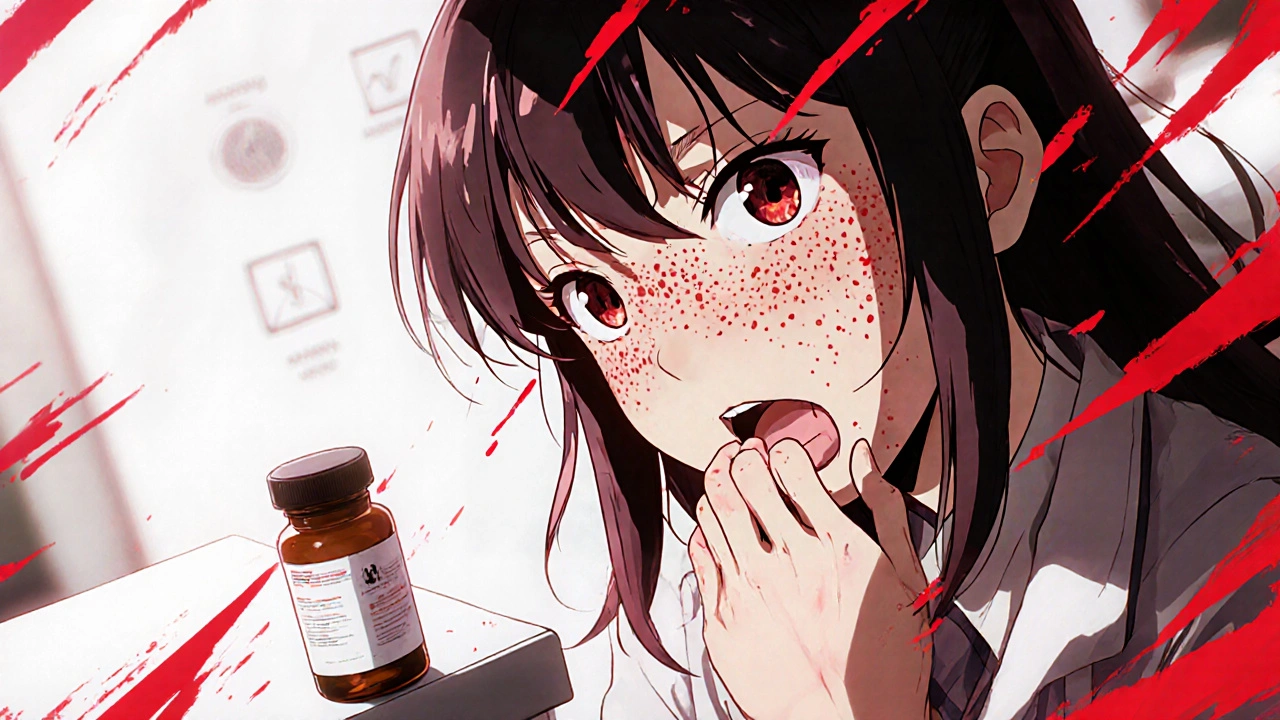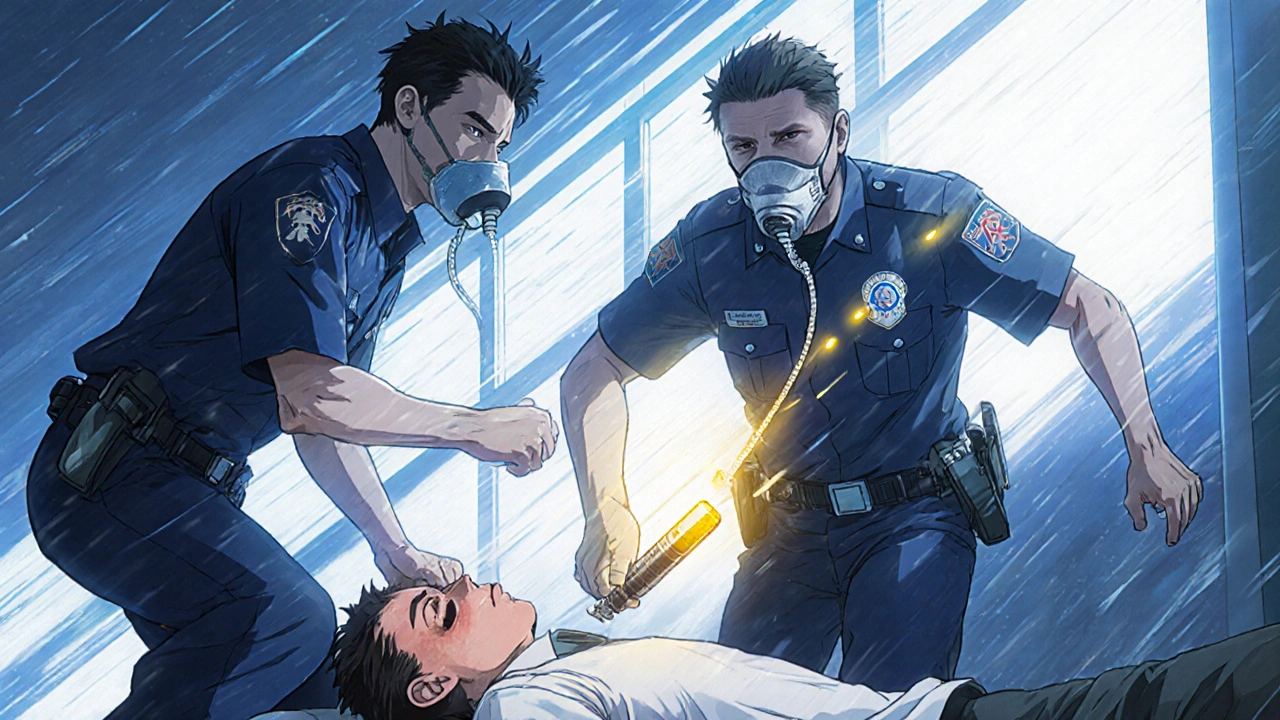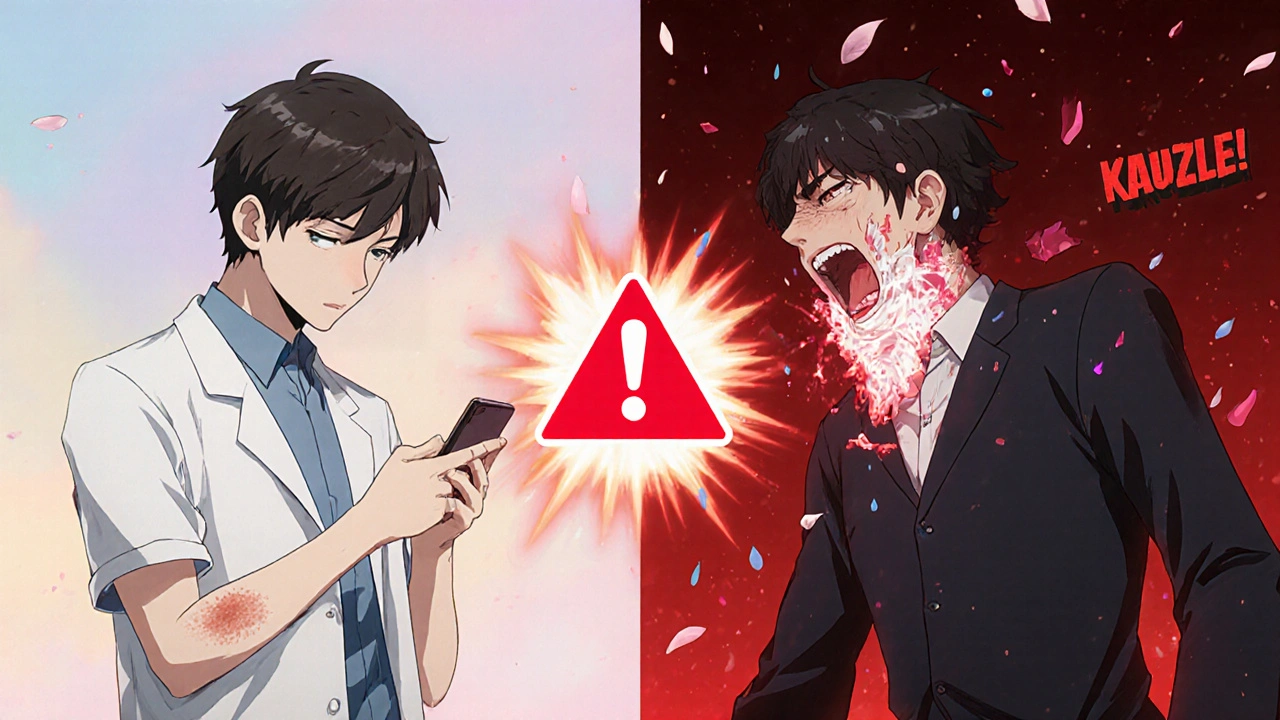When to Call 911 vs Contact Your Doctor About Medication Reactions

Medication Reaction Emergency Checker
Check Your Symptoms
Select any symptoms you're experiencing. This tool is based on guidelines from the article "When to Call 911 vs Contact Your Doctor About Medication Reactions".
Select symptoms to get guidance
Your selection will appear here
Not every reaction to a medication is an emergency - but some are life-or-death.
You took your pill like always. Five minutes later, your skin starts itching. Maybe a few red bumps show up. Or maybe your throat feels tight. Your stomach churns. You’re dizzy. Now you’re wondering: do I call 911 or just text my doctor?
The answer isn’t always obvious. Many people wait too long because they don’t know the difference between a bothersome side effect and a dangerous reaction. And that delay can cost minutes - maybe your life.
What counts as a serious medication reaction?
Medications can cause all kinds of reactions. Some are annoying, like a headache or upset stomach. Those are common side effects. They’re unpleasant, but they won’t kill you.
But when your body treats a drug like a foreign invader - like a poison - your immune system goes into overdrive. That’s a drug allergy. And it can turn deadly fast.
The worst kind is anaphylaxis. It’s not just a rash. It’s your whole body going into shock. Symptoms come on quickly - often within an hour of taking the medicine. And they don’t stay mild.
Call 911 immediately if you have any of these symptoms
If you’re experiencing any one of these, don’t wait. Don’t text. Don’t call your doctor’s office. Dial 911 right now.
- Swelling of your tongue, lips, or throat
- Wheezing, gasping, or trouble breathing - even if you’ve never had asthma
- A tight feeling in your chest or throat
- A weak, fast, or fluttering pulse
- Dizziness, fainting, or feeling like you’re going to pass out
- Vomiting or diarrhea along with hives or a rash
- Loss of consciousness
These aren’t "maybe" symptoms. They’re red flags. And they don’t wait.
One woman in Dublin took her new antibiotic and started itching. She thought, "I’ll wait and see if it gets worse." Twenty minutes later, her throat closed. She couldn’t speak. She collapsed. Her neighbor called 911. She survived - but barely. "If I’d waited another ten minutes," she told her doctor, "I wouldn’t be here."
Why you can’t wait - even if you feel okay
People think: "I took epinephrine, so I’m fine." Or: "The rash went away. It must be over."
That’s dangerous.
Even if your symptoms seem to calm down after using an epinephrine auto-injector, you still need emergency care. One shot doesn’t always fix everything. Your body can have a second wave of symptoms - sometimes hours later. That’s called a biphasic reaction. And it’s why hospitals make you stay for observation.
Emergency responders carry epinephrine, oxygen, and IV fluids. They can stabilize you faster than any clinic. And they know how to handle a collapsing airway or sudden drop in blood pressure - things your doctor’s office can’t do.
According to the Food Allergy Research & Education organization, half of all fatal anaphylaxis cases happen because people waited too long to call for help.

When you can wait and call your doctor
Not every skin reaction is an emergency.
If you have only one of these, it’s likely a mild reaction:
- A simple rash or hives with no other symptoms
- Itching without swelling or breathing trouble
- Mild nausea or diarrhea - no dizziness or vomiting
- Headache or drowsiness
In these cases, you can call your doctor or visit urgent care within 24 hours. Take a photo of the rash. Note when the symptoms started. Write down the name of the medicine and the dose. That helps your doctor figure out if it’s an allergy or just a side effect.
But here’s the catch: if that rash spreads, or you start feeling dizzy, or your throat gets tight - stop waiting. Call 911 now.
What if you’re not sure?
This is the biggest mistake people make: they second-guess themselves.
"Is it serious? Maybe it’s just stress."
Or: "I don’t want to waste their time."
Here’s the truth: if you’re unsure, call 911.
Emergency dispatchers are trained to ask the right questions. They can help you decide in real time. And they’ll send help if needed. You won’t be "wasting" their time. You’ll be saving it.
CPR Seattle’s advice is simple: "If you aren’t sure if symptoms are severe enough to warrant a 911 call, then you should err on the side of caution and assume that they will be worsening quickly. Make the phone call before the symptoms become life-threatening."
Epinephrine: Use it - even if you’re scared
If you’ve been prescribed an epinephrine auto-injector (like an EpiPen), keep it with you. Always.
Some people hesitate to use it because they’re afraid of side effects. They worry about their heart racing. They think, "Maybe I don’t need it."
Here’s what you need to know: epinephrine is safe. The risks of not using it - death - are far greater than any side effect.
The Food Allergy Research & Education organization says: "When in doubt, use it!"
Even if you’re elderly or have heart disease, you still need epinephrine for anaphylaxis. The danger of an allergic reaction outweighs the risk of the medicine.
Use it as soon as you notice serious symptoms. Then call 911. Even if you feel better after the shot, you still need to go to the hospital.

Know your meds - and your risks
Some drugs are more likely to cause allergic reactions. Antibiotics like penicillin are the most common. But painkillers, seizure meds, and even some IV contrast dyes can trigger them too.
If you’ve ever had a reaction to a drug, write it down. Tell every doctor, dentist, and pharmacist. Put it in your phone notes. Keep a list.
And if you’ve had a reaction before, ask your doctor about getting an epinephrine auto-injector. Even if it was "mild," future reactions can be worse.
What happens after you call 911?
When paramedics arrive, they’ll check your airway, give you oxygen, and likely give you more epinephrine. They’ll start an IV and monitor your heart and blood pressure.
You’ll be taken to the ER. They’ll keep you for several hours - sometimes overnight - to watch for a delayed reaction.
Afterward, you’ll probably be referred to an allergist. They’ll run tests to confirm what caused the reaction and help you avoid it in the future.
You’ll get a medical alert bracelet. And you’ll learn exactly what to do next time.
Bottom line: Don’t guess. Act.
Medication reactions aren’t a game. You can’t afford to wait for a second opinion. You can’t wait for your doctor to return your call. You can’t hope it’ll go away.
If you have trouble breathing, swelling in your throat, dizziness, or vomiting with a rash - call 911 now.
If it’s just a rash or itching? Call your doctor tomorrow.
But if you’re even a little unsure? Call 911.
One call can save your life. Waiting for a sign you don’t need to wait for? That’s how people die.
Can a medication reaction happen days after taking the pill?
Yes. While most serious reactions happen within an hour, some - like DRESS syndrome or serum sickness - can take days or even weeks to show up. These are rare but serious. If you develop a widespread rash, fever, swollen glands, or joint pain days after starting a new drug, contact your doctor immediately.
Do I need to carry epinephrine if I’ve never had a severe reaction?
Only if your doctor has prescribed it. But if you’ve had even a mild allergic reaction before - like hives or swelling - you should talk to your doctor about getting one. Reactions often get worse each time. Having epinephrine on hand could save your life the next time.
Can I just go to urgent care instead of calling 911?
Only if your symptoms are mild - like a rash without breathing trouble, dizziness, or swelling. If you have any signs of anaphylaxis - trouble breathing, throat tightness, vomiting with a rash, or dizziness - urgent care can’t help you fast enough. Emergency responders have the tools and training to save your life on the spot. Don’t risk waiting.
What if I’m not sure if it’s a drug reaction or something else?
It doesn’t matter. If you’re having trouble breathing, swelling, or feeling faint, treat it like a drug reaction - even if you think it’s a cold or food poisoning. The treatment is the same: call 911. It’s better to be safe than sorry. Emergency teams can figure out the cause once you’re stable.
Will calling 911 cost me a lot of money?
In Ireland, emergency ambulance services are free for life-threatening situations. Even if you’re not sure, calling 911 is the right thing to do - and you won’t be charged for a true emergency. The cost of waiting? That’s not something you can pay your way out of.
Can I take antihistamines like Benadryl instead of calling 911?
No. Antihistamines help with mild itching or rashes - but they do nothing for airway swelling, low blood pressure, or breathing trouble. In a severe reaction, they’re too slow and too weak. Epinephrine is the only treatment that can stop anaphylaxis. If you’re having serious symptoms, antihistamines are not enough. Call 911.
How do I know if a rash is from a drug or something else?
A drug rash often appears within days of starting a new medication. It may be flat, raised, itchy, or spread across your body. But the key clue? It shows up after you took the medicine. If you’ve never had a rash like this before - and you started a new pill, injection, or IV - suspect the drug. Still, if it’s accompanied by fever, swelling, or trouble breathing, treat it as an emergency.

Willie Doherty
November 22, 2025 AT 05:09While the article provides a solid clinical framework, it lacks nuance regarding pharmacokinetic variability across populations. For instance, elderly patients on polypharmacy regimens may exhibit delayed hypersensitivity responses due to altered hepatic metabolism-this is not adequately addressed. Additionally, the implicit assumption that all patients have equal access to epinephrine auto-injectors ignores socioeconomic disparities in healthcare infrastructure, particularly in rural Ireland. A more robust guideline would incorporate risk stratification by age, comorbidity, and medication class-not just symptomatology.
Darragh McNulty
November 22, 2025 AT 06:27THIS. 😭 I had a friend who waited because she thought it was "just a rash"... turned out she needed 3 EpiPens and a ventilator. Don’t be her. If you’re even 10% unsure? CALL 911. 🚑💙 You’re not overreacting-you’re being smart.
David Cusack
November 22, 2025 AT 17:05Let me be clear: the notion that "if you’re unsure, call 911" is not merely irresponsible-it is a catastrophic erosion of medical triage principles. Emergency services are not a customer service hotline for anxious laypersons who can't tolerate mild discomfort. The dilution of true emergencies with hypochondriacal panic undermines the system for those who actually need it-those with airway compromise, cardiac arrest, or hemorrhagic shock. Your "better safe than sorry" mentality is a luxury that strains public resources. Be responsible. Educate yourself. Don't be the person who clogs the system because you read a blog post.
Elaina Cronin
November 24, 2025 AT 10:06David, your comment is not only dangerously dismissive-it is morally indefensible. People do not choose to have anaphylaxis. They do not choose to panic when their throat swells. To suggest that calling 911 out of fear is a "luxury" or an "erosion" is to dehumanize the very people this article seeks to protect. You speak of "responsibility," yet you ignore the fact that 50% of fatal anaphylaxis cases occur because people waited. I have sat beside a hospital bed while a mother begged her daughter to breathe. You don’t get to lecture us on "triage" when you’ve never held someone’s hand as their oxygen saturation drops to 78%. If you cannot summon empathy, at least have the decency to stay silent.
Steve Harris
November 26, 2025 AT 04:08Elaina’s response hits hard-and rightly so. But I also think David’s concern isn’t *entirely* baseless. We *do* need better public education so people understand the difference between a mild rash and anaphylaxis. Maybe we need more community workshops, or even QR codes on prescription bottles linking to symptom checkers. The goal isn’t to discourage people from calling 911-it’s to help them *recognize* when it’s truly needed. Empathy + education = better outcomes. Not either/or.
Michael Marrale
November 27, 2025 AT 20:24Wait… so you’re telling me the government isn’t secretly adding fluoride to antibiotics to make people allergic so they’ll call 911 and get tracked by the medical-industrial complex? 😏 I mean, think about it-pharma makes billions off epinephrine pens, ER visits, and allergist referrals. And why do they push this "call 911 at the first itch" narrative? To normalize fear. To keep you dependent. I had a rash after amoxicillin in 2017. Called 911. They gave me Benadryl and charged me $12,000. Coincidence? I think not. 🕵️♂️💉
David vaughan
November 29, 2025 AT 16:19I really appreciate how this post breaks it down-especially the part about biphasic reactions. I didn’t know that symptoms could come back even after using an EpiPen. That’s terrifying… and important. 🙏 I’ve got my EpiPen in my bag at all times now, and I showed my mom how to use it too. She’s 72 and takes blood pressure meds-she didn’t realize she could be at risk. Thanks for making me feel less alone in this. Also, I printed the symptom list and taped it to my fridge. Just in case. 😅
Logan Romine
December 1, 2025 AT 08:30So we’re now treating allergic reactions like a morality play? Call 911 = virtuous. Wait = cowardly? How quaint. The real tragedy isn’t the delay-it’s the fact that we’ve outsourced critical decision-making to strangers on a phone line who’ve memorized a script written by a committee that’s never held a dying person’s hand. We’ve turned medicine into a game of risk-avoidance bingo. You win if you call 911. You lose if you trust your gut. But here’s the twist: your gut? It’s been trained by fear. And fear? It’s the most profitable drug of all.